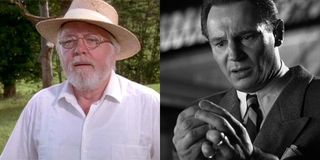Spielberg Double Feature: Schindler's List, Jurassic Park, And A Fascination With History

With Jurassic Park coming back to theaters this week, we're looking back at the years when Steven Spielberg released two films, and how those films reflect on each other. First up, appropriately enough, is Jurassic Park with its 1993 classmate Schindler's List.
“Your scientists were so preoccupied with whether they could that they didn't stop to think if they should.”
On the surface, Steven Spielberg’s 1993 double-header of Jurassic Park and Schindler’s List have nothing obvious in common. How could anyone make connections between a thrill-a-minute popcorn blockbuster about rampaging dinosaurs and a deeply personal historical tome about the horrors of the Holocaust?
But in watching Spielberg’s films back to back for the purpose of this assignment, I was surprised to see evident similarities between Richard Attenborough’s John Hammond and Liam Neeson’s Oskar Schindler – egotistical men of wealth and power who peddle their influence for a perceived greater good, even as it costs them virtually everything they’ve ever worked for.
The above quote belongs to Jeff Goldblum’s Dr. Ian Malcolm, a chaos theorist who sees right through the charade of Hammond’s dinosaur park because he instantly recognizes the harmful repercussions of Hammond’s work. Anyone able to take a step back and observe the efforts of both Hammond and Schindler would be able to see how foolish, risky, potentially rewarding but unreasonably dangerous their schemes are. Just because you have the means to do something doesn’t necessarily mean you should actually do it.
Hammond, more than Schindler, is a snake-oil salesman. He’s a carnival barker who believes he’s promoting the greatest possible show on earth. Attenborough has a wonderful monologue about an early flea circus Hammond once tried to run, and it tells us everything we need to know about the man. Science has presented him with an opportunity to capitalize on a great financial endeavor. He will not listen to the naysayers telling him how dangerous Jurassic Park is because in his mind – and in his ego – the possibility of the attraction is simply too tantalizing to pass up.
Schindler is the opposite side of the same coin. Like Hammond, he’s using his existing wealth to capitalize on the intersection of fates. In Schindler’s case, it’s the outbreak of war -- and he positions himself at the top of a production line to maximize growth potential and, in the process, save the lives of hundreds of Jewish workers who are protected by his employment. Where Hammond had the Greek chorus of Satler, Dr. Grant (Sam Neill) and Dr. Malcolm (Jeff Goldblum) singing the dangers of Jurassic Park, Schindler had the nervous confidences of his accountant, Itzhak Stern (Sir Ben Kingsley). Both men are warned repeatedly of the inherent dangers of their work that wait around every corner … personified by either velociraptors or vile SS officers. And truthfully, I’m not sure which I’d prefer to see in a dark alley.
CINEMABLEND NEWSLETTER
Your Daily Blend of Entertainment News
Fascinating parallels exist between Hammond and Schindler, men who sacrificed everything to establish their legacies. I’m equally interested in the contributions Jurassic Park and Schindler’s List made to Spielberg’s legacy. Ever since the staggering one-two punch of the popcorny Park and the Oscar-baity List, Spielberg has earned a reputation – fair or not – for often following a “one for audiences, one for me” pattern. In 1997, Amistad followed The Lost World: Jurassic Park, while 2005 brought both War of the Worlds and Munich.
Instead of dissecting the dichotomy of Spielberg’s output, I’m more interested in his tendency to use his tools to recreate history – a point that had eluded me until I began to analyze these movies side by side.
Spielberg has 27 feature-length films to his credit. Only seven of them are set in modern time (or what was considered modern at the time). Even Park, which takes place in present day, goes to great lengths to resurrect creatures from the distant past. And there’s a staggering amount of confidence in his storytelling in both films. Park pushes all of the buttons of a traditional summer blockbuster, but crackles with the craftsmanship of a director who had successfully maneuvered audiences through two Indiana Jones movies. By the time he reached Jurassic Park, Spielberg knew exactly how to tell this kind of story. Interestingly, he’d push himself into darker territories in subsequent blockbusters like Minority Report and War of the Worlds, which amaze with spectacle but aren’t meant to be as much fun as Park.
As for Schindler’s List, it’s relatively amusing to think that Spielberg, at the time, lacked confidence in his own ability to create a formidable Holocaust movie. Perhaps at the time, Spielberg saw himself merely as the roller-coaster-ride operator. But List gave way to Saving Private Ryan, Munich, Amistad and the Band of Brothers series – serious meditations on history that might not exist if Spielberg didn’t have the courage to attempt Schindler’s List.
Spielberg’s fascination with history colors both of his 1993 epics, and sets the tone for his entire filmography. Jurassic Park and Schindler’s List look nothing alike. But their existence proves Spielberg will always have a future in filmmaking, so long as he can continue to mine compelling stories from humanity’s past.

Sean O’Connell is a journalist and CinemaBlend’s Managing Editor. Having been with the site since 2011, Sean interviewed myriad directors, actors and producers, and created ReelBlend, which he proudly cohosts with Jake Hamilton and Kevin McCarthy. And he's the author of RELEASE THE SNYDER CUT, the Spider-Man history book WITH GREAT POWER, and an upcoming book about Bruce Willis.
Most Popular






